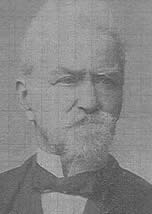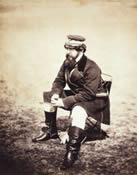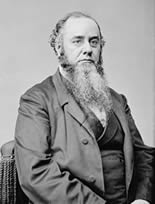North Carolina War Between the States Sesquicentennial
Northern Newspaper Opinion

Benjamin Franklin Grady, of Duplin County, writes the following of Northern newspapers circa 1860-1861:
Northern Sentiment adverse to coercion is expressed in the following extracts from newspapers
(taken from Greeley’s American Conflict, Vol. I, beginning on p. 395)
The Albany [New York] Argus of November 10, 1860, said:
“We sympathize with and justify the South as far as this:
their rights have been invaded to the extreme limit possible within the forms of the Constitution; and beyond
this limit, their feelings have been insulted and their interests and honor assailed by almost every possible form of
denunciation and invective; and, if we deemed it certain that the real animus of the Republican party could be
carried into the administration of the Federal Government, and became the permanent policy of the Nation, we should
think that all the instincts of self-preservation and of manhood rightfully impelled them to a resort to revolution and a
separation from the Union, and we would applaud them and wish them God-speed in the adoption of such a remedy.”
The Rochester [New York] Union, “two or three days later” said:
“restricting our remarks to actual violations of the Constitution, the North have led the way, and for a long period
have been the sole offenders, or aggressors. * * * Owing to their different circumstances, Northern States have been
enabled to secure their cherished object by violating the Constitution in a way that does not necessitate secession * * *
Owing to their peculiar circumstances, the Southern States can not retaliate upon the North
without taking ground for secession.”
The Albany Argus, November 12, said:
“If South Carolina, or any other State, through a Convention of her people, shall formally separate herself from the Union,
probably both the present (Buchanan) and the next (Lincoln) Executive will simply let her alone, and quietly allow all
the functions of the Federal Government to be suspended. Any other course would be madness.”
The New York Herald, November 9, said:
“Each State is organized as a complete government, holding the purse and wielding the sword, possessing the right
to break the tie of the confederation as a nation might break a treaty, and to repel coercion as a nation might repel invasion.
Coercion, if it were possible, is out of the question.”
The New York Express, April 15, 1861, said:
“The ‘irrepressible conflict,’ started by Mr. Seward and endorsed by the Republican Party, has at length attained
to its logical foreseen result. That conflict, undertaken ‘for the sake of humanity,’ culminates now in inhumanity itself,
and exhibits the afflicting spectacle of brother shedding brother’s blood. Refusing the ballot before the bullet, these men,
flushed with the power and patronage of the Federal Government, have madly rushed into a civil war, which will probably
drive the remaining slave States into the arms of the Southern Confederacy, and dash to pieces the last hope for
a reconstruction of the Union.
To the cold-blooded, heartless demagogues who started this civil war—themselves magnanimously keeping out of
the reach of bodily harm—we can only say, You must find your account, if not at the hands of an indignant people,
then in the tears of widows and orphans. The people of the United States, it must be borne in mind, petitioned, begged,
and implored these men, who are become their accidental masters, to give them an opportunity to be heard before the
unnatural strife was pushed to a bloody extreme, but their petitions were all spurned with contempt,” etc.
In another editorial the Express said:
“They fight upon their own soil, in behalf of their dearest rights—for their public institutions, their homes, and their property.
The South, in self-preservation, has been driven to the wall and forced to proclaim its independence.
A servile insurrection and wholesale slaughter of the whites will alone satisfy the murderous designs of the abolitionists.
The Administration egged on by the halloo of the Black Republican journals of this city, has sent its mercenary
forces to pick a quarrel and initiate the work of desolation and ruin. A call is made for an army of volunteers,
under the pretense that an invasion is apprehended of the Federal Capital; and the next step will be to summon
the slave population to revolt and massacre.”
The Utica [New York], Observer said:
“Brave men, fighting on their own soil, and, as they believe, for their freedom and dearest rights, can never be subjugated.
Who are to fight the battles of sectional hatred in this sad strife? The seceders will fight; but will the abolitionists,
who have combined with them to overthrow the Union, make themselves food for powder? The abolitionists will sneak
in the background, leaving those to do the fighting who have no interests in the bloody strife, no hatred against their brethren.”
The Bangor [Maine] Union said:
“Democrats of Maine! The loyal sons of the South have gathered around Charleston, as your fathers of old gathered
about Boston, in defense of the same sacred principles of liberty—principles which you have ever upheld and
defended with your vote, your voice, and your strong right arm. Your sympathies are with the defenders of the
truth and the right. Those who have inaugurated this unholy and unjustifiable war are no friends of yours—
no friends of Democratic Liberty. Will you aid them in their work of subjugation and tyranny?
Say to them fearlessly and boldly, in the language of England’s great Lord, the Earl of Chatham,
"If I were a Southerner, as I am a Northerner, while a foreign troop was landed in my country,
I would never lay down my arms—never, NEVER, NEVER.’”
The Journal of Commerce [New York] said:
“No doubt it has been precipitated by the sending of a fleet with troops by the United States Government,
for the relief (as was understood) of Sumter. And on the other hand, it may be said that this action...was occasioned
by the cutting off of supplies from Fort Sumter by the Confederate authorities, which rendered it necessary to send
them from New York or some other point. Too this again, it may be replied, that the cutting off of the supplies
by the Confederate authorities was caused by the long continued delay of the United States authorities to take
or consent to any measures of adjustment of the pending differences, thus leaving the Confederate authorities
subject to the necessity of maintaining a large military force at Charleston for an indefinite period, or
abandon their claim altogether,” etc.
The Boston Post said:
“An extra session of Congress should be called at once”—which Mr. Lincoln refused to do—“and if that
body prove incompetent to the duty required, then a National Convention should be convened; and, if all
measures for a satisfactory adjustment fail, after full hearing and answers to statements of discontent,
let it (the South) depart in peace, if possible,” etc.
(The Case of the South Against the North, pp. 295-299)

Newspapers, Censorship and Mercenaries”
“The North…was witnessing the first attempt at saturation coverage. As a mass of correspondents
jostled for positions, the very strength of their numbers began to militate against good reporting.
Comradeship and compassion vanished in the race for exclusive news. One correspondent begged a
wounded officer not to die before he had finished interviewing him and, as an inducement, promised
him that his last words would appear in “the widely-circulated and highly influential journal I represent.”
Accuracy became a minor consideration. Casualties were grossly underestimated; generals listed as
killed lived on to die of old age; battles were reported on days when there was no action at all; at times
the whole Southern army was reported to be marching on Washington; Atlanta was reported captured
a week before the battle for the town took place. It was a small step from ignoring accuracy to faking whole reports.
Junius Browne of the New York Tribune collected from officers details of the Battle of Pea Ridge (March 1862)
and wrote a brilliant, but entirely imaginary, “eye-witness” report.
(After Manassas], the first clash of the war…indications of Northern superiority had sent the Northern
war correspondents hurrying to Washington to write accounts of a great victory. Although the Associated
Press managed to get news of this momentous defeat to the telegraph office, to be sent to New York,
it went no farther. The general-in-chief of the Northern forces, Winfield Scott, had stopped its transmission,
and so the results of the first major act of censorship in the war was chaos, with all the New York
newspapers carrying stories of a glorious victory that was, in fact, a scandalous defeat.

The Secretary of War, Edwin M. Stanton, began to dicker with casualty figures. He altered an account
of Grant’s failure at Petersburg, reducing the losses to about a third of their actual number. His department
withheld the news of the surrender of Harper’s Ferry for twenty-four hours and changed “10,000 Union troops
surrendered” first to “6,000” and in later dispatches to “4,000.” The actual figure was 11,200.
Stanton took to censoring newspapers that had broken censorship rules, arresting editors, threatening
proprietors with court-martial, and banning correspondents from the front, and he actually issued orders
for Henry Wing of the New York Tribune to be shot for refusing to hand over a dispatch
he had written for his newspaper.
What other stories did correspondents miss…or refrain from writing?
One of the cruel facts of the war was that the North, although it considered itself to be fighting
for the survival of democracy, could not raise enough volunteers willing to risk their lives for this cause.
The South claimed that Northern men of military age were so unwilling to join the army that the majority
of the Union troops were foreigners….taking the official figures, one soldier in three was foreign,
most of them being German or Irish. Some eastern States had to introduce a bounty system to
fill their regiments, a practice that led to men being shanghaied into service,
when conscription was introduced in 1863.
Many posed the question the North was reluctant to ask: if the cause of the Union was such a noble one,
why was there such violent opposition to the idea of fighting for it?”
(The First Casualty, The War Correspondent as Hero, Propagandist, and Myth Maker.
Phillip Knightly, Harcourt, Brace, Jovanovich, 1975, pp. 26-29)
Sources and Bibliography:
THe Case of the South Against the North, B.F. Grady, Edwards & Broughton, 1899
Copyright 2011, North Carolina War Between the States Sesquicentennial Commission